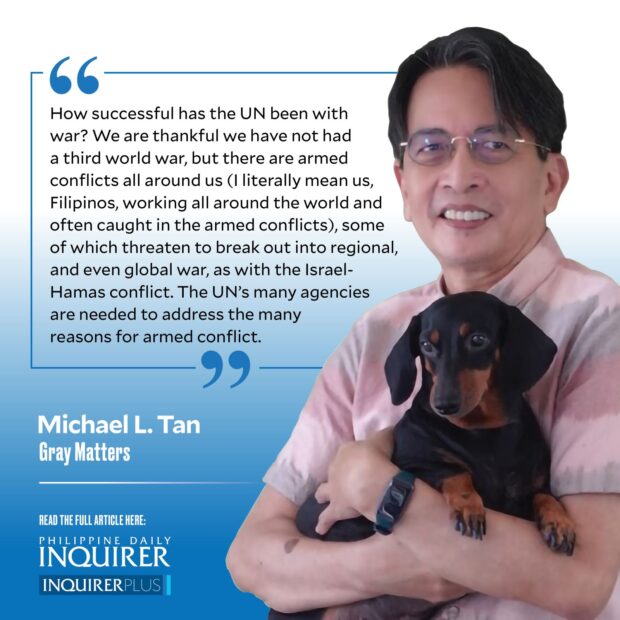UN at 78

After years of destruction and death, the end of World War II must have seemed excruciatingly slow to happen. Hitler committed suicide in April 1945 and Germany surrendered in May. Japan, which was technically defeated in the Philippines and other occupied territories early in the year, held out and a surrender was not formally signed until September.
A few weeks later, on Oct. 24, 1945, 51 nations including the Philippines (then a Commonwealth under the US) signed a United Nations Charter establishing the UN.
Finally, it seemed, world peace would come but I wouldn’t be surprised if there was much skepticism at that time … and in our own times. After all, a League of Nations was established in 1920 right after the end of World War I, and while it managed to establish international cooperation around epidemics, slavery, refugees, and the improvement of labor conditions, it failed to prevent a second, bloodier world war less than 20 years later.
But hopes for world peace continued and as early as 1942, in the thick of World War II, the United States and the United Kingdom already signed an Atlantic Charter envisioning a post-war world, culminating in the UN.
Today the UN has 193 member states, many winning their independence from their colonizers between 1945 and 1960, sometimes through bloody struggles. I mention this because as former colonies became part of the UN, they often espoused fierce nationalism and spoke out against the superpowers.
The UN has built a huge bureaucracy throughout its 78 years, with highly specialized agencies. Many of these agencies are in the Philippines, some with regional offices, such as the World Health Organization (WHO) with Manila hosting the Western Pacific Regional Office.
The Philippines has always been active in the UN, including sending, since 1963, some 15,000 Filipinos to participate in 21 peacekeeping operations.
Filipinos are also found in many of the UN offices, including the two international headquarters in New York and Geneva. Standing out are the Filipinos, most are women, working as interpreters, a crucial role when you think of what mistranslations can do.
With so many member nations and with diverse political philosophies, the UN is highly politicized. The WHO meetings often became word (not world) wars.
The Philippines has been known to be mostly aligned, when voting on international issues, to the United States. President Rodrigo Duterte turned things around, taking an anti-UN stand after being internationally criticized for his war on drugs and his violation of human rights. In 2021, he declared the UN “a product of an era long past. It no longer reflects the political and economic realities of today.”
Duterte’s anti-UN position actually converged with former US president Donald Trump, who withdrew from the UN Human Rights Council and threatened to cut off US funds from other UN agencies when they espoused ideas different from his own.
One UN that keeps attracting the ire of US presidents is the UNFPA, which promotes family planning. Republican presidents Ronald Reagan, Bush Senior and Bush Junior, and Trump, pandering to their conservative constituents, have cut off funds to UNFPA alleging they promote abortion.
In his UN Day message for 2023, UN Secretary General António Guterres notes how the UN has been flexible, addressing challenges that didn’t exist when it was founded 75 years ago. He specifically mentioned the “existential climate crisis” (I’m intrigued by his use of the word “existential”) and “the perils and promises of artificial intelligence or AI.”
Time magazine reports in a recent issue that there are discussions within the UN to establish a new agency that will be specifically handling AI, even as they recognize that this might take a long time, with powerful countries resenting any agency that might try to regulate something like AI, given that companies developing AI are from these countries.
How successful has the UN been with war? We are thankful we have not had a third world war, but there are armed conflicts all around us (I literally mean us, Filipinos, working all around the world and often caught in the armed conflicts), some of which threaten to break out into regional, and even global war, as with the Israel-Hamas conflict.
The UN’s many agencies are needed to address the many reasons for armed conflict. Even the climate emergency, when you think about it, causes so much displacement of populations and, when they migrate to developed countries, become the target of violent racism.
In his UN Day message, Guterres reiterated the UN’s commitment “to heal divisions, repair relations, and build peace” and added that after peace building, the need is to “expand opportunities and leave no one behind.” That’s another way of describing the need for social justice, without which peace will remain elusive.
—————-
mtan@inquirer.com.ph




















